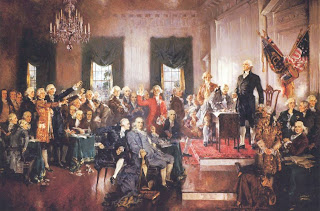
Ask a Congressman about the constitutionality of the health care legislation and one is likely to hear an answer similar the one given by House Majority Whip James Clyburn. He said, “There’s nothing in the Constitution that says that the federal government has anything to do with most of the stuff we do.”
One might even hear a response like the one given by Congressman Phil Hare when he said, “I don’t worry about the Constitution on this to be honest… I care more about the people that are dying everyday that don’t have health insurance.”
When asked “where in the Constitution does Congress get the authority to mandate that individuals get health insurance,” Senator Kent Conrad replied, “I’ll refer you to the legal counsel for the Senate and they’re the ones that lead there as the full legal basis for the individual mandate—and I assume it’s in the Commerce Clause.”
The reasoning employed by Clyburn, Hare, and Conrad, as well as many others, is disturbing for a number of reasons.
To begin, the Framers of the Constitution did not view the Commerce Clause as giving to Congress any sort of positive power. Instead, the Framers gave Congress the power to prevent States from stopping interstate commerce. In a letter to Joseph Cabell, James Madison, the Father of the Constitution, wrote that the Commerce Clause “grew out of the abuse of the power by the importing States in taxing the non-importing, and was intended as a negative and preventive provision against injustice among the States themselves, rather than as a power to be used for the positive purposes of the General Government.”
To dismiss the suits filed by nineteen states as purely political is wholly inaccurate. It is even more erroneous to suggest that the health care legislation is constitutional because “it is in line with a long line of precedents.”
Randy Barnett, a constitutional law professor at Georgetown University, recently said that the lawsuits are “definitely not frivolous.” In reference to precedents, Professor Barnett said, “Anything that has never been done before has no precedent for it. And this has never been done before.”
Even though “this has never been done before,” the discussion of precedent is still necessary. Many of the pending lawsuits center on the Supreme Court’s decision in United States v. Lopez. In this decision, the Court ruled that Congress does, indeed, have the power to regulate, activities that substantially affect interstate commerce.
Fortunately, the Court ruled that having a gun within a thousand feet of a school did was not related to interstate commerce. Additionally, the legislation which had been enacted by Congress was deemed unconstitutional because Congress was regulating something which had been traditionally left to the States.
As can be seen, there are similarities which exist between the upcoming legal battle and United States v. Lopez. Congress is once again attempting to regulate an area which has traditionally been left to the States. Also, a gap exists between the goals of the health care legislation and interstate commerce. As in United States v. Lopez, it will be up to the federal government to show that health care substantially affects interstate commerce. This would seem to be a daunting task—as it was in United States v. Lopez.
We should expect to have leaders who adhere to the Constitution—the Framers certainly expected as much! Never forget that Jefferson wrote, “The natural progress of things is for liberty to yield, and government to gain ground.”
Remember those who place Constitutional authority below their own preferences when voting in November!
